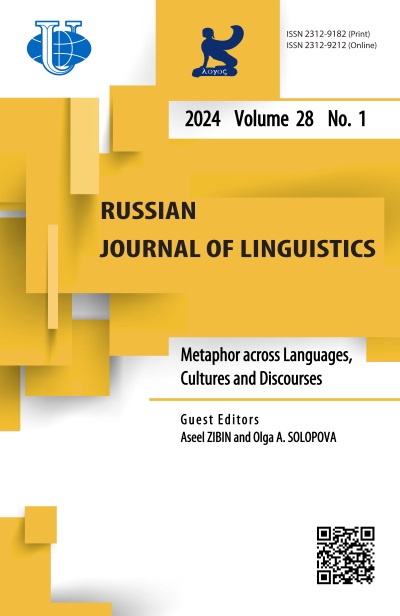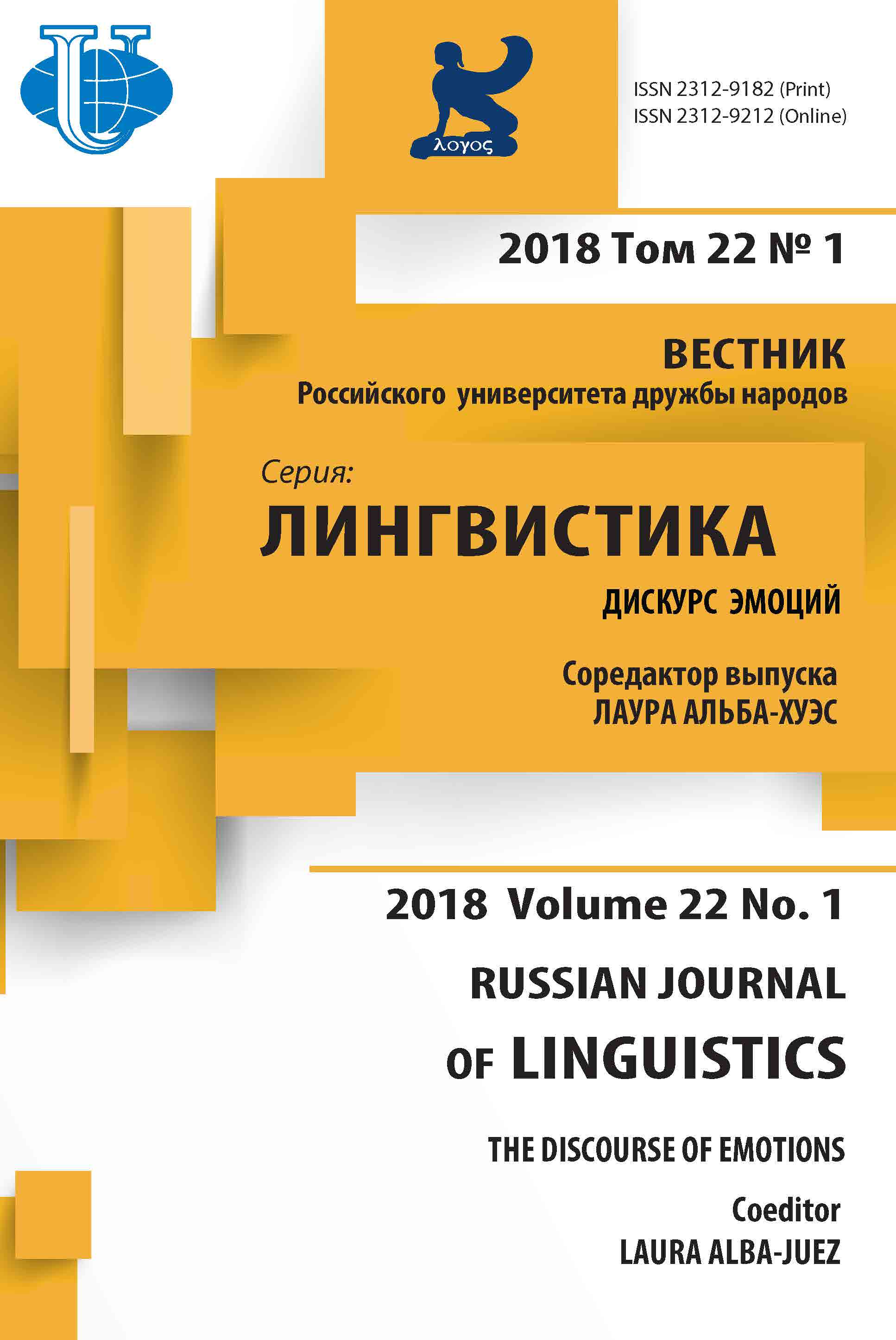DISCOURSE VARIATION OF THE CONCEPTS OF DESTRUCTIVE EMOTIONS
- Authors: Volkova YA1, Panchenko NN2
-
Affiliations:
- RUDN University
- Volgograd State Social-Pedagogical University
- Issue: Vol 22, No 1 (2018): The discourse of emotions
- Pages: 175-194
- Section: Articles
- URL: https://journals.rudn.ru/linguistics/article/view/17854
- DOI: https://doi.org/10.22363/2312-9182-2018-22-1-175-194
Cite item
Full Text
Abstract
About the authors
Y A Volkova
RUDN University
Email: yana.a.volkova@gmail.com
YANA A. VOLKOVA is a Doctor of Philology, professor at the Department of Foreign Languages Theory and Practice at the RUDN University (Moscow, Russia). Her research interests cover the theory of communication, communicative categories, destructive communication, discourse analysis, emotiveness in language, linguoecology. Miklukho-Maklaya str., 7, Moscow, Russia, 117198
N N Panchenko
Volgograd State Social-Pedagogical University
Email: panchnn@yandex.ru
NADEZHDA N. PANCHENKO is a Doctor of Philology, professor, Head of the Department of Linguistics at Volgograd State Social-Pedagogical University (Volgograd, Russia). Her research interests embrace discourse analysis, discourse of mass media, authenticity of communication, communicative categories, communicative types, linguoecology, speech genres. Lenin Prospekt 27, Volgograd, Russia, 400066
References
- Антология концептов / под ред. В.И. Карасика, И.А. Стернина. М.: Гнозис, 2007. [Antologiya konceptov. In V.I. Karasik, I.A. Sternin (Eds). Moscow: Gnozis, 2007 (In Russ.)]
- Аристотель. Никомахова этика. [Электронный ресурс]. URL: http://www.philosophy.ru/library/ aristotle/nic_ethic.html (дата обращения: 15.03.2017). [Aristotel'. Nikomakhova etika. (Nicomachean Ethics) Retrieved from: http://www.philosophy.ru/library/aristotle/nic_ethic.html. Accessed on 15.03.2017. (In Russ.)]
- Виноградов В.В. Язык Пушкина. Москва-Ленинград: «Academia», 1935. 490 с. [Vinogradov, V.V. (1935) Yazyk Pushkina [The Language of Pushkin]. Moscow-Leningrad: Academia. (In Russ.)]
- Волкова Я.А. Деструктивное общение в когнитивно-дискурсивном аспекте: монография. Волгоград: Перемена, 2014. 324 с. [Volkova, YA.А. (2014). Destruktivnoe obshhenie v kognitivno-diskursivnom aspekte.Volgograd: Peremena. (In Russ.)]
- Воркачев С.Г. Оценка и ценность в языке. HISPANICA SELECTA. Избранные работы по испанистике: монография. Волгоград: Парадигма, 2006. 186 с. [Vorkachev, S.G. (2006) Otsenka i tsennost' v yazyke. HISPANICA SELECTA. Izbrannye raboty po ispanistike. (Evaluation and Value in Language). Volgograd: Paradigma. (In Russ.)]
- Воркачев С.Г. Ex Pluribus Unum: лингвокультурный концепт как синтезное образование // Вестник Российского университета дружбы народов. Серия: Лингвистика. 2016. Т. 20. № 2. С. 17-30. [Vorkachev, S.G. (2016) Ex Pluribus Unum: Linguocultural Concept as a Synthesis Formation. Russian Journal of Linguistics. Vestnik RUDN, 2, 17-30 (In Russ.)]
- Дмитриева Н.А. Сопоставительный анализ семантической структуры лексических единиц, вербализующих концепт «эмоция» в лингвокультурах русского, английского, французского и итальянского языков // Вестник Российского университета дружбы народов. Серия: Лингвистика. 2015. № 1. С. 81-93. [Dmitrieva, N.A. (2015) A Comparative Analysis of the Semantic Structure of Lexical Units Verbalizing the Concept of “Emotion” in Russian, English, French and Italian Linguocultures. Russian Journal of Linguistics. Vestnik RUDN, 1, 81-93. (In Russ.)]
- Додонов Б.И. В мире эмоций. Киев: Политиздат Украины, 1987. 140 с. [Dodonov, B.I. (1987) V mire emotsii. Kiev: Politizdat Ukrainy. (In Russ.)]
- Изард К. Психология эмоций. СПб.: Питер, 2000. 464 с. [Izard, K. (2000) The Psychology of Emotions. Saint Petersburg: Piter. (In Russ.)]
- Ильин Е.П. Эмоции и чувства. СПб.: Питер, 2001. 752 с. [Il'in, E.P. (2001) Emotsii i chuvstva. Saint Petersburg: Piter. (In Russ.)]
- Карасик В.И. Языковой круг: личность, концепты, дискурс. Волгоград: Перемена, 2002. 477 c. [Karasik, V.I. (2002) Yazykovoi krug: lichnost', kontsepty, diskurs. Volgograd: Peremena. (In Russ.)]
- Красавский Н.А. Эмоциональные концепты в немецкой и русской лингвокультурах. М.: Гнозис, 2008. 374 с. [Krasavskij, N.A. (2008). EHmotsional'nye kontsepty v nemetskoj i russkoj lingvokul'turakh. Moscow: Gnozis. (In Russ.)]
- Колесов В.В. Философия русского слова. СПб, 2002. 448 с. [Kolesov, V.V. (2002) Filosofiya russkogo slova. Saint Petersburg. (In Russ.)]
- Ларина Т.В. Прагматика эмоций в межкультурном контексте // Вестник Российского университета дружбы народов. Серия: Лингвистика. 2015. № 1. С. 144-163. [Larina, T.V. (2015) Pragmatics of Emotions in Intercultural Context. Russian Journal of Linguistics. Vestnik RUDN, 1, 144-163. (In Russ.)]
- Лоренц К. Агрессия (так называемое зло) / пер. с нем. М.: Издательская группа «Прогресс», «Универс», 1994. 272 с. [Lorents, K. (1994) Agressiya (tak nazyvaemoe zlo). Moscow: Izdatel'skaya gruppa «Progress», «Univers». (In Russ).]
- Лоренц К. Оборотная сторона зеркала. М.: Республика, 1998. 497 с. [Lorents, K. (1998) Oborotnaya storona zerkala. Moscow: Respublika. (In Russ.)]
- Попова З.Д., Стернин И.А. Семантико-когнитивный анализ языка. Изд. 2. Воронеж: Истоки, 2007. 250 с. [Popova, Z.D., Sternin, I.A. (2007). Semantiko-kognitivnyj analiz yazyka. Voronezh: Istoki. (In Russ.)]
- Степанов Ю.С. Константы: Словарь русской культуры. М.: Академический Проект, 2001. [Stepanov, Y.S. (2001) Konstanty: Slovar Russkoy kultury. Moscow: Akademicheskii Proekt. (In Russ.)]
- Телия В.Н. Русская фразеология. Семантический, прагматический, и лингвокультурологический аспекты. М.: Школа: «Языки русской культуры», 1996. [Telija, V.N. (1996). Russkaya frazeologiya. Semanticheskii, pragmaticheskii, i lingvokul'turologicheskii aspekty. Moscow: Shkola: «Jazyki russkoj kul'tury». (In Russ.)]
- Шаховский В.И. Категоризация эмоций в лексико-семантической системе языка. Воронеж: Воронеж. гос. ун-т, 1987. [Shakhovskiy, V.I. (1987) Kategorizaciya emociy v leksiko-semanticheskoy sisteme yazyka. Voronezh, Voronezhskii gosudarstvennyi universitet. (In Russ.)]
- Шаховский В.И. Лингвистическая теория эмоций: монография. М.: Гнозис, 2008. 416 c. [Shakhovskij, V.I. (2008). Lingvisticheskaya teoriya ehmotsij. Moscow: Gnozis. (In Russ.)]
- Davidson, W.L. (1912) Envy and Emulation. In J. Hastings (Ed.), Encyclopedia of Religion and Ethics, Vol. 5. New York and Edinburgh: Scribner /Clark. Retrieved from: http://www.archive.org/ details/encyclopaediaofr05hastuoft.
- Gevaert, C. (2007). The history of anger: The lexical field of anger from Old to Early Modern English (Unpublished doctoral dissertation). University of Leuven, Belgium. Retrieved from: https://lirias.kuleuven.be/bitstream/1979/893/2/thesisgedrukt.
- Hess, U. (2014) Anger is a positive emotion. In W. G. Parrott (Ed.), The Positive Side of Negative Emotions. Guilford Press, New York, London, 55-75.
- Kövecses, Z. (1990). Emotion Concepts. NY: Springer-Verlag. 230 p.
- Kövecses, Z. (2005). Metaphor in Culture: Universality and Variation. Cambridge University Press. 314 p.
- Lakoff, G. (1987). Women, Fire, and Dangerous Things. What Categories Reveal about the Mind. Chicago-London: The Univ. of Chicago Press.
- Rozin, P., Lowery, L., Imada, S. & Haidt, J (1999) The CAD triad hypothesis: A mapping between three moral emotions (contempt, anger, digust) and three moral codes (community, autonomy, divinity). Journal of Personality and Social Psychology, 76, 574-586.
- Shakhovsky, V.I. (2006). Emotions in Communication: Dominants of Semantics through Language Expression. In I.N. Rozina (Ed.), Communication Theory and Practice: The Collected articles: Bulletin of the Russian Communication Association. Vol. 4. Rostov-na-Donu: Institute of Management.
- Tissari, H. (2007). Current Emotion Research in English Linguistics: Words for Emotions in the History of English. Emotion Review, 86-94. Vol. 9 (1).
- Volek, B. (1987). Emotive Signs in Language and Semantic Functioning of Derived Nouns in Russian. Amsterdam-Philadelfia.
- Wierzbicka, A. (1999). Emotions across languages and cultures: Diversity and Universals. Cambridge: Cambridge University Press.
- БАС - Словарь современного русского литературного языка. Т. 3. М.; Л.: Наука, АН СССР, 1954. [BAS - Slovar' sovremennogo russkogo literaturnogo yazyka. T. 3. M.; L.: Nauka, AN SSSR, 1954.]
- Кузнецов С.А. Большой толковый словарь русского языка. СПб.: Норинт, 2008. [Kuznetsov, S.A. (2008) Bol'shoi tolkovyi slovar' russkogo yazyka. SPb.: Norint.]
- Даль В.И. Толковый словарь русского языка в 4 т. Т. 1-4. М.: Наука, 1999. [Dal', V.I. (1999) Tolkovyi slovar' russkogo yazyka v 4 t. T. 1-4. M.: Nauka.]
- Национальный корпус русского языка. URL: www.ruscorpora.ru (дата обращения: 25.02.2017) [Nacional’ny’j korpus russkogo yazyka. Retrieved from: www.ruscorpora.ru. Accessed on 25.02.2017.]
- НТСС - Новый толково-словообразовательный словарь русского языка / под ред. Т.Ф. Ефремовой: в 2 т. М.: Дрофа, Русский язык, 2000. [NTSS - Novyi tolkovo-slovoobrazovatel'nyi slovar' russkogo yazyka / pod red. T.F. Efremovoi: v 2 t. M.: Drofa, Russkii yazyk, 2000.]
- РАС - Русский ассоциативный словарь: от стимула к реакции (около 7000 стимулов): В 2 т. / Ю.Н. Караулов, Г.А. Черкасова, Н.В. Уфимцева. М.: ООО «Изд-во Астрель»; ООО «Издво АСТ», 2002. [RAS - Russkii assotsiativnyi slovar': ot stimula k reaktsii (okolo 7000 stimulov): V 2 t. / Yu.N. Karaulov, G.A. Cherkasova, N.V. Ufimtseva. M.: OOO «Izd-vo Astrel'»; OOO «Izd-vo AST», 2002.]
- Ожегов С.И., Шведова Н.Ю. Толковый словарь русского языка. М.: Изд-во «Азъ», 1992. [Ozhegov, S.I., Shvedova, N.Yu. (1992) Tolkovyi slovar' russkogo yazyka. M.: Izd-vo «Az"».]
- Дмитриев Д.В. Толковый словарь русского языка / под ред. Д.В. Дмитриева. М.: Астрель: АСТ, 2003. [Dmitriev, D.V. (2003) Tolkovyi slovar' russkogo yazyka / pod red. D.V. Dmitrieva. M.: Astrel': AST.]
- Ушаков Д.Н. Толковый словарь русского языка: в 4 т. / под ред. проф. Д.Н. Ушакова. М.: ООО «Изд-во Астрель», «Изд-во АСТ», 2000. [Ushakov, D.N. (2000) Tolkovyi slovar' russkogo yazyka: v 4 t. / pod red. prof. D.N. Ushakova. M.: OOO «Izd-vo Astrel'», «Izd-vo AST».]
- Фасмер М. Этимологический словарь русского языка: в 4-х т. / пер. с нем. и доп. О.Н. Трубачева. СПб.: Терра-Азбука, 1996. [Fasmer, M. (1996) Etimologicheskii slovar' russkogo yazyka: v 4-kh t. / per. s nem. i dop. O.N. Trubacheva. SPb.: Terra-Azbuka.]
- Шанский Н.М. Этимологический онлайн-словарь русского языка Шанского Н.М. [Электронный ресурс]. URL: https://shansky.lexicography.online/ (дата обращения: 05.03.2017). [Shanskii, N.M. Etimologicheskii onlain-slovar' russkogo yazyka Shanskogo N.M. [Elektronnyi resurs]. Retrieved from: https://shansky.lexicography.online/ Accessed on: 05.03.2017.]

















